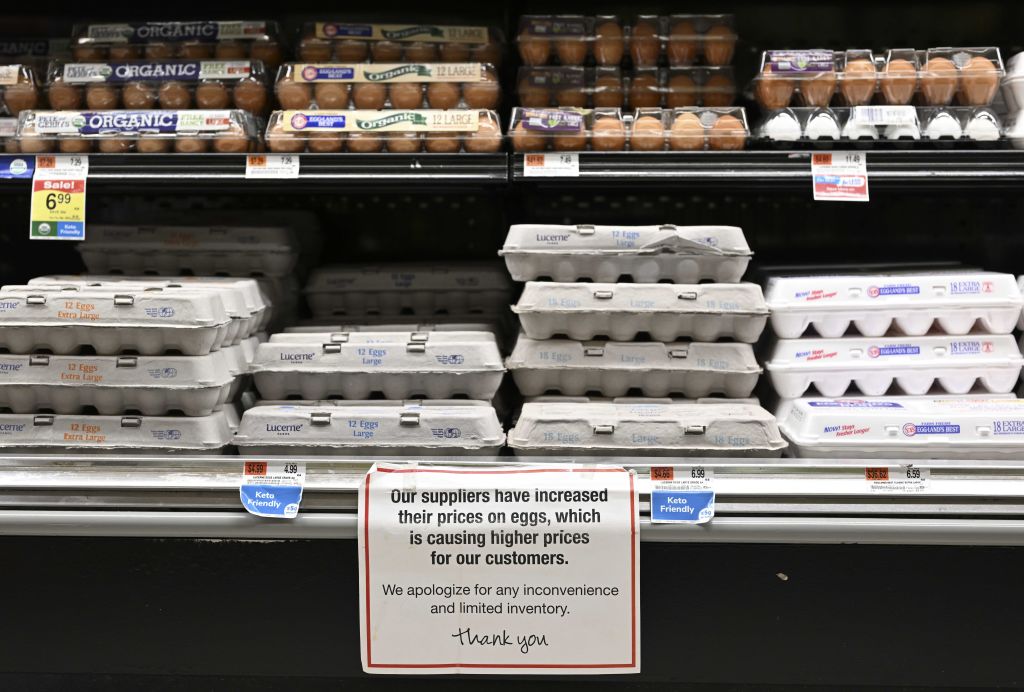Millions to face 'hunger cliff' as emergency SNAP benefits come to an end


A free daily email with the biggest news stories of the day – and the best features from TheWeek.com
You are now subscribed
Your newsletter sign-up was successful
Millions of Americans who rely on federal assistance to buy food are facing a "hunger cliff," as 32 states prepare to phase out emergency food stamp benefits in March, Insider reports.
Over 30 million people enrolled in the Supplemental Nutrition Assistance Program, or SNAP, will be affected by the upcoming cuts, according to data from the U.S. Department of Agriculture. The reductions are due to the end of emergency allotments which increased SNAP benefits at the beginning of the COVID-19 pandemic in 2020. The omnibus spending bill passed in December included a provision to end the pandemic-era emergency allotments.
Eighteen states have already phased out the emergency food benefit allotments, citing the strengthening economy, CBS News says. But while the economy has improved as of late, many households still face a cost of living crisis driven by high grocery costs, rental prices, and utility fees. Grocery prices were 10 percent higher in December than they were the year prior, per CBS, "making the timing of the SNAP cuts particularly challenging, experts say." For example, data from the Bureau of Labor Statistics shows that the price for a dozen large eggs "saw a massive uptick from November to December," Insider summarizes.
The Week
Escape your echo chamber. Get the facts behind the news, plus analysis from multiple perspectives.

Sign up for The Week's Free Newsletters
From our morning news briefing to a weekly Good News Newsletter, get the best of The Week delivered directly to your inbox.
From our morning news briefing to a weekly Good News Newsletter, get the best of The Week delivered directly to your inbox.
"This hunger cliff is coming to the vast majority of states," Ellen Vollinger, the SNAP director at the Food Research & Action Center, tells CBS. On average, individuals will lose "about $82 of SNAP benefits a month," which Vollinger calls "a stunning number."
The cost of living crisis is a global concern, driven by rising food prices and high energy costs in the wake of Russia's invasion of Ukraine. In the United Kingdom, the rising cost of living has led to months of strikes "by nurses, ambulance workers, train drivers, and other public-sector employees seeking higher pay," The Washington Post writes.
A free daily email with the biggest news stories of the day – and the best features from TheWeek.com
Theara Coleman has worked as a staff writer at The Week since September 2022. She frequently writes about technology, education, literature and general news. She was previously a contributing writer and assistant editor at Honeysuckle Magazine, where she covered racial politics and cannabis industry news.
-
 What to know before filing your own taxes for the first time
What to know before filing your own taxes for the first timethe explainer Tackle this financial milestone with confidence
-
 The biggest box office flops of the 21st century
The biggest box office flops of the 21st centuryin depth Unnecessary remakes and turgid, expensive CGI-fests highlight this list of these most notorious box-office losers
-
 The 10 most infamous abductions in modern history
The 10 most infamous abductions in modern historyin depth The taking of Savannah Guthrie’s mother, Nancy, is the latest in a long string of high-profile kidnappings
-
 How your household budget could look in 2026
How your household budget could look in 2026The Explainer The government is trying to balance the nation’s books but energy bills and the cost of food could impact your finances
-
 With economic uncertainty, 2025 looks to be a 'No Buy' year
With economic uncertainty, 2025 looks to be a 'No Buy' yearIn the spotlight Consumers are cutting back on splurges to combat overconsumption
-
 3 tips to lower your household bills
3 tips to lower your household billsThe Explainer Prices on everything from eggs to auto insurance to rent have increased — but there are ways to make your bills more manageable
-
 What's next for US interest rates?
What's next for US interest rates?The Explainer A pause after a series of cuts
-
 Where will inflation go next?
Where will inflation go next?The Explainer Believe it or not, inflation is easing up
-
 What is shrinkflation and why is it happening?
What is shrinkflation and why is it happening?The Explainer The practice reduces the size of a product without lowering the price — and it's perfectly legal
-
 What is dynamic pricing, and how will its increasing adoption affect your wallet?
What is dynamic pricing, and how will its increasing adoption affect your wallet?Speed Read The practice of adjusting prices based on demand is becoming more common
-
 4 steps to get back on your feet financially after identity fraud
4 steps to get back on your feet financially after identity fraudspeed read The more proactive you are, the greater chance you have of mitigating the impacts
